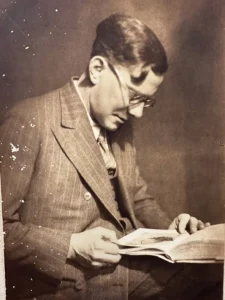
My religious sense and sensibilities are perhaps best described by Paul Tillich, an influential German author of the 20th Century. Politically I am not the socialist that Tillich is said to have been. I believe that humans will never achieve what is envisioned as absolute equality. Our innermost psyche seems to be inclined to hierarchical social organization. Social Darwinism and meritocracy seem to matter then, with attempts at diversity, equality, and inclusion (DEI) just being pragmatic niceties.
https://aeon.co/essays/my-grandfather-paul-tillich-the-unbelieving-theologian
“Tillich’s thought was founded on the conception of humans as finite and separate individual mortal beings. While limited by their finitude, humans always search for meaning, purpose, and justification, concepts that refer to the infinite Universe beyond themselves. As finite beings, humans can never reach or grasp the infinite but remain deeply concerned with and driven by the ultimate questions of meaning and purpose in their lives.
In understanding Tillich’s theology, it is important to begin with his two key concepts: faith and God. Tillich considered faith not a belief in the unbelievable, but the ‘state of being grasped by an ultimate concern’; and he conceived of God not as a being, but as ‘the ground of being’. Both concepts are consistent with secular humanist as well as religious conceptions of the Universe.”
“For Tillich, religion, morality, and meaning come from humans, not God.”
“His idea of God as not a being, but the ‘ground of being’ and Man as a finite being, means that God is beyond the intellectual grasp of humans, and religious statements about the nature of God can never be taken literally.”
“Tillich conceived of God as a symbolic object of the universal human concern for ultimate questions of meaning and purpose. God is thus outside our Universe and is a symbol for the answers to our deepest questions, but the answers always elude our grasp.”
” God is a symbolic object that is a repository of ultimate concern, but not a being.”
“in Tillich’s theology, God is an abstract and somewhat inactive concept. The action all comes from the human side through faith. God is the unreachable object of our ultimate concern.”
Well, if God’s nature is opaque to humans, as Tillich suggested, so must God’s will be. Religious dogmas and doctrines are all suspect.
Classical Christianity
The first principle of classical Christianity seems to posit that there must be a God, an unmoved mover – so to speak. Unificationism cannot and does not do any better. The Divine Principles derives from the same premise of that first cause – the unmoved mover, via a chain of logical inferences that merely set out the implications of the initial principle in such a way that the certainty of the first principle is transferred to the claims inferred from it (the method of Spinoza’s ethics). Sure, additional new concepts are introduced, e.g., Spirit World, angles, etc., that cannot be plausibly interpreted as the logical consequences of the previous ones to make the entire religious case even more hypothetical.


